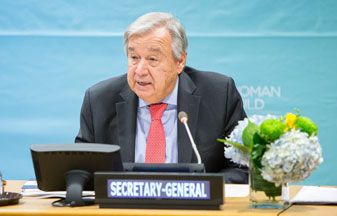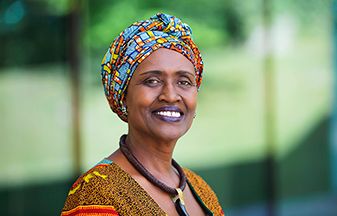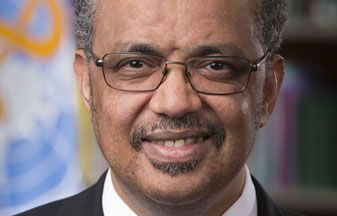
This World AIDS Day, UNAIDS is highlighting the urgent need to end the inequalities that drive AIDS and other pandemics around the world. Read statements from leaders around the world
Without bold action against inequalities, the world risks missing the targets to end AIDS by 2030, as well as a prolonged COVID-19 pandemic and a spiralling social and economic crisis.
Forty years since the first AIDS cases were reported, HIV still threatens the world. Today, the world is off track from delivering on the shared commitment to end AIDS by 2030 not because of a lack of knowledge or tools to beat AIDS, but because of structural inequalities that obstruct proven solutions to HIV prevention and treatment.
Economic, social, cultural and legal inequalities must be ended as a matter of urgency if we are to end AIDS by 2030.
Although there is a perception that a time of crisis is not the right time to prioritize tackling the underlying social injustices, it is clear that without doing so the crisis cannot be overcome.
Tackling inequalities is a long-standing global promise, the urgency of which has only increased. In 2015, all countries pledged to reduce inequalities within and between countries as part of the Sustainable Development Goals. The Global AIDS Strategy 2021–2026: End Inequalities, End AIDS and the Political Declaration on AIDS adopted at the 2021 United Nations High-Level Meeting on AIDS have ending inequalities at their core.
As well as being central to ending AIDS, tackling inequalities will advance the human rights of key populations and people who are living with HIV, make societies better prepared to beat COVID-19 and other pandemics and support economic recovery and stability. Fulfilling the promise to tackle inequalities will save millions of lives and will benefit society as a whole.
But ending inequalities requires transformative change. Political, economic and social policies need to protect the rights of everyone and pay attention to the needs of disadvantaged and marginalized communities.
We know how to beat AIDS, we know what the inequalities obstructing progress are and we know how to tackle them. The policies to address inequalities can be implemented, but they require leaders to be bold.
Governments must now move from commitment to action. Governments must promote inclusive social and economic growth. They must eliminate discriminatory laws, policies and practices in order to ensure equal opportunity and reduce inequalities. It is time for governments to keep their promises. They must act now, and we must make them accountable.
This World AIDS Day let’s remind our governments that global inequalities affect us all, no matter who we are or where we are from. This World AIDS Day let’s demand action to end inequalities and end AIDS and all other pandemics that thrive on inequalities.
UNAIDS warns of millions of AIDS-related deaths and continued devastation from pandemics if leaders don’t address inequalities
GENEVA, 29 November 2021—UNAIDS issued a stark warning today that if leaders fail to tackle inequalities the world could face 7.7 million* AIDS-related deaths over the next 10 years. UNAIDS further warns that if the transformative measures needed to end AIDS are not taken, the world will also stay trapped in the COVID-19 crisis and remain dangerously unprepared for the pandemics to come.
Top-line messages
We face an AIDS emergency.
We can’t afford not to act. Unless leaders take bold action to end the inequalities driving AIDS, we face millions more deaths.
If the transformative measures needed on AIDS are not taken, the world will also stay trapped in the Covid crisis and be dangerously unprepared for the pandemics to come.
We can still end AIDS by 2030, but only if we act courageously and together to take on inequalities.
We know what works from seeing brilliant responses in some places – but we need to apply that everywhere for everyone.
We have an effective strategy that leaders agreed this year at the UN – but it needs to be implemented in full.
The transformative approach that we need to end AIDS will also protect the world against future pandemics.
The measures needed to tackle inequalities include:
- Community-led and people-centred infrastructure
- Equitable access to medicines, vaccines and health technologies
- Human rights, to build trust and tackle pandemics
- Elevating essential workers, and providing them with the resources and tools they need
- People-centred data systems that highlight inequalities
We have reached a fork in the road. The choice for leaders to make is between bold action and half-measures. The data is clear: it is being too gradual that is the unaffordable choice.
Every minute that passes, we are losing a precious life to AIDS. We don’t have time.
End inequalities. End AIDS. End pandemics.
THE WORLD IS EXPERIENCING MORE THAN ONE PANDEMIC: AIDS IS A PANDEMIC TOO.
- Gains in ending the AIDS pandemic are at risk of being lost as attention has been diverted to COVID-19. AIDS is a pandemic, and it hasn’t gone away.
- The AIDS pandemic did not take a break during COVID-19. While the world was preoccupied with the COVID-19 pandemic, the AIDS response has soldiered on. Nimble, community-centred and community-led AIDS responses have proved to be resilient to the disruptions of COVID. But these disruptions have taken a toll. Results are slipping.
- People still became infected, especially key populations and adolescent girls and young women.
- People still died from AIDS-related illnesses.
- People living with and affected by HIV still faced discrimination and violations of their human rights.
- Yes, there has been tremendous progress on AIDS, but we are far, far away from ending the HIV pandemic.
- The goal of ending AIDS risks being derailed by the COVID-19 pandemic and by overstretched and weakened health systems.
- The United Nations General Assembly has agreed on ambitious global AIDS targets for 2025. Meeting these targets requires governments to focus on ending inequalities, to invest in community-led responses and to respect human rights.
- The new global AIDS strategy sets out an evidence-informed road map to ending AIDS by 2030. The strategy can help the world to not only end AIDS but also end COVID-19. Two pandemics, but a similar way to end both.
COVID-19 HAS BEEN SO MUCH WORSE THAN IT COULD HAVE BEEN. AS THE WORLD MOBILIZES AGAINST COVID-19 AND PREPARES AGAINST FUTURE PANDEMICS, WE RISK REPEATING MANY OF THE SAME MISTAKES THAT HAVE KEPT US FROM ENDING AIDS.
- The world wasn’t prepared for COVID-19, and we have seen the results in human suffering and in financial burden.
- Being prepared for and ready to respond to future pandemics will saves lives and money.
- We cannot afford to make the same mistakes again.
- Pandemics thrive on the fault lines of inequalities.
- Addressing inequalities is critical to ending AIDS and COVID-19 and preventing future pandemics.
- International and national pandemic plans and responses are missing critical components for success: people, communities, human rights, equity and financing.
- Governments will be accountable if they fail to prepare for the next pandemic.
- Both AIDS and COVID-19 can be ended and future pandemics can be prevented with strong political leadership, action and accountability.
- Governments must prioritize investments in health and development.
THE HUMAN RIGHTS BASED, GENDER TRANSFORMATIVE APPROACH WE NEED TO END AIDS IS THE SAME APPROACH NEEDED TO TAKE TO STOP FUTURE PANDEMICS.
- We have an unprecedented opportunity to end pandemics by investing in a core framework that is common to the response to all pandemics and by addressing health inequalities.
- IF WE DO NOT reshape our AIDS and pandemic responses urgently the list of deadly pandemics will continue to grow—taking lives, hindering growth and ruining communities and societies.
- IF WE DO what is needed, the results will be repaid in terms of human health and development and financially.
THE COURSE CORRECTIONS WE NEED TO END AIDS WILL ALSO PROTECT THE WORLD AGAINST FUTURE PANDEMICS. WE NEED A PARADIGM SHIFT IN GLOBAL HEALTH FINANCING AND TO INVEST IN COMMUNITY-LED, HUMAN RIGHTS-BASED, GENDER TRANSFORMATIVE RESPONSES, ESSENTIAL WORKERS, EQUITABLE ACCESS TO LIFE-SAVING MEDICINES AND HEALTH TECHNOLOGIES, DATA SYSTEMS THAT CAN DETECT INEQUALITIES, AND RIGHTS-BASED APPROACHES THAT ADDRESS THOSE INEQUALITIES.
- AIDS, COVID-19 and future pandemics can be stopped by urgently acting on human rights-based people-centred elements that are largely missing from pandemic preparedness and response discussions:
- People, and especially specific communities and population groups, not viruses, must be at the centre of pandemic preparedness and response.
- No one is safe until everyone is safe.
- Pandemic responses must focus on the vulnerable and the most affected in every setting, including the people most affected by HIV.
- We must pay attention to identify the vulnerable and protect the most affected in current and future pandemics.
- Advances in HIV happened when the most vulnerable were counted and were included in decision-making about their own health.
- Community-led public health infrastructure is critical for pandemic preparedness.
- Where public health systems have engaged and empowered the communities most affected by HIV:
- Communities have helped to ensure continuity of HIV treatment services during COVID-19.
- Well-informed communities have countered disinformation around HIV and COVID-19.
- Communities have been at the forefront of providing protection and basic services to marginalized communities and key populations.
- We need to invest in and protect all essential workers—from community health workers to doctors, teachers, social workers and unpaid care givers.
- Access to affordable medicines, vaccines and diagnostics is a crucial part of pandemic preparedness. Medicines, vaccines, diagnostics and other health technologies must be considered as public goods to respond to pandemics and protect the marginalized, displaced and vulnerable in all socioeconomic settings.
- Investing in integrated, people-centred data systems.
- Without disaggregated data, inequalities remain hidden, and programmes risk ignoring the vulnerable and most at risk.
- Good data identifies the vulnerable, reveals geographic and population inequalities and supports access to life-saving services.
- We must listen to and trust the science in shaping pandemic responses.
- We must keep human rights and gender equality at the centre of responses to pandemics so that inequality gaps are closed.
- Investing in health = reducing inequalities = increased growth and increased security for everyone.




